Overview
- Brief Narrative
- Denk Fix! [Think Quick!] card and question/answer game with spinner brought with 8 year old Anneliese Centawer when she and her parents James and Recha fled Nazi Germany in July 1938. After Hitler and the Nazi regime's seizure of power in 1933, the Jewish population was subjected to increasingly harsh persecution. In 1936, Anneliese's family was forced to move from their home in Nuremberg when their block was declared Judenfrei (Free of Jews.) Anneliese was beaten up on the street by a Hitler Youth who accused the freckled, red haired girl of trying to pass for German. In July 1938, with sponsorship from Recha's half-siblings in the US, the family arrived in New York.
- Date
-
emigration:
1938 July
- Geography
-
creation:
Nuremberg (Germany)
- Credit Line
- United States Holocaust Memorial Museum Collection, Gift of Anneliese C. Marx
- Markings
- a. exterior, top, black ink : Denk fix! D. R. W. Z. / Ein lustiges Frage-Spiel / mit 1000 Antworten / Spear-Spiel / Nr. 1339 [Think quick! Deutsches Reichs Waren Zeichen German Nationally Registered Trademark. A fun question game with 1,000 answers. Spear-Spiel Nr. 1339]
a. exterior, long sides, black ink : Denk fix!
a. exterior, short sides, black ink : Denk fix! / (logo)
a. interior, bottom, black ink : J. W. Spear & Söhne / Nürnberg.
a. interior, black ink : Denk fix! Originalasugabe. / DRW3. / Ein frage-und Antwortspiel für beliebig viele Teilnehmer aller Altersstufen. / Das Spiel, das mehr als 1000 lustige und ernste Antworten ermöglicht, den die fragen der / 48 käartchen lassen sich ja so vielseitig beantworten. / Ein Spielleiter übernimmt die Rolle des Ausrufers. Er hat die gut gemischten frage- / karten vor sich zu liegen, hebt eine davon ab und liest die frage laut und deutlich / vor. Dann setzt er die Drehscheibe in Bewegung und nennt den Buchstaben, der bei / ihrem Stillstand durchs fensterchen schaut. / Aufgabe der Mitspieler ist es nun, so schnell wie möglich die passende Antwort mit / dem genannten Anfangsbuchstaben zu finden. Einen „Wunsch” wird man wohl leicht / durch das ganze ABC finden, auch einen „Namen” oder eine „Blume”. Wenn aber / ein Baum mit „W” ode rein Gebäudeteil mit „R” anfangen soll, ist es schon schwieriger. / Und da wird im Eifer auch manchmal humor über „fix denken” gehen! / Wer das richtige Wort zuerst ausruft, erhält die karte. Nur der erste Ruf gilt! fallen / gleichzeitig zwei richtige Lösungen, so wird bei gleichlautenden Worten die karte in den Vorrat zurückgelegt. Bei zwei verschiedenen, aber richtigen Worten erhält das / den Vorzug, das dem Wörterbuch nach zuerst kommt (3. B. Main vor Mosel). Wer / ein falsches Wort ruft, muβ zur Strafe ein kärtchen abgeben, das in den Vorrat zu- / rückwandert. Wird einmal trotz längeren Besinnens kein passendes Wort gefunden, / so ermittelt der Spielleiter durch die Drehscheibe einen neuen Buchstaben. / Sind alle fragekärtchen beantwortet, ist das Spiel beendet. Gewonnen hat, wer die / moisten karten besitzt. / Manch fröhliche Stunde bereitet „Denk fie!” den kleinen und den Groβen. Tiefes / Wissen behauptet seinen Platz neben Witz und humor. Nicht zu vergessen aber ist der / hohe erzieherische Wert, der in diesm Spiel liegt. [Think Quick! Original edition. Question and answer game for any number of participants of all ages. The game allows more than 1000 funny and serious replies, 48 question cards allows a variety of answers. The crier shiuffles the cards, sets the turntable in motion and calls out the letter visible through the little window when it stops. The task of the other players is to find the right answer beginning with the stated letter asap. A “Wish” is probably easily found using the ABCs, also a “name” or a “flower”. But when a tree should start with a “W” or a building with an “R”, it is more difficult. Think Quick is an enthusiatic and humorous game.! Whoever yells out the right word first, gets the card. Only the first call applies! When 2 correct answers are called at the sam time and are same word, the card is returned to the pool. When there are 2 different answers, the word that comes first in the dictionary is given preference (Main before Mosel). If you call the wrong word, you give up a card to the pool as punishment. If in spite of prolonged thinking, no matching word is found, the crier spins for a new letter. When all the question cards are answered, the game is over. The winner is the one with the most cards. Many long and short happy hours are spent with “Think Quick”. Deep knowledge is placed alongside wit and humor. A game with high educational value.] - Contributor
-
Subject:
Anneliese C. Marx
Manufacturer: J.W. Spear & Sohne, Nurnberg
- Biography
-
Anneliese Centawer was born on January 10, 1930, to James and Recha Huetzler (Hützler) Centawer in Nuremberg, Germany. Her mother Recha was born on June 23, 1891, in Huettenbach, Germany, to Moritz (1840-1922) and Amalie Selig Huetzler (1857-1918.) Recha had four younger brothers and nine half-siblings from her father’s first marriage to Babette Talman. Recha was part of a very wealthy and large, extended family which owned several department stores and extensive financial holdings. Several family members immigrated to the United States in the 1880s. Recha’s father was a cattle dealer. Anneliese’s father James was born on July 21, 1888, in Nuremburg to Moritz (1830-1920) and Marie Gutmann Centawer (1854-1932.) His father operated a shoestore. James had a sister Henriette. James was a lieutenant in the German Army during World War I (1914-1918.) He then became the European trade representative for an electrical company that manufactured transformers. James and Recha married on August 17, 1924, and settled in Nuremberg. After the January 1933 appointment of Adolf Hitler as Chancellor of Germany, the Nazi dictatorship enacted plans to persecute Jews and exclude them from German society. Anneliese attended the Israelitsche Folkshul and was taught German and Jewish subjects. Antisemitism increased and, on one occasion, Anneliese was beaten by a member of the Hitler Youth who, because of her red hair and freckles, accused Anneliese of trying to pretend to be a German. In 1936, the family had to move because their block was declared Judenfrei [Free of Jews.] In March 1938, with sponsorship by three of Recha's half-siblings in the US, the family received American visas. Anneliese and her parents sailed from Hamburg on the Manhattan and arrived on July 7, 1938, in New York.
The family settled in the Bronx in New York City. During the war, Anneliese’s father James worked for the US Office of War Information in the censorship bureau and then for the US Treasury Department. They learned that three of Recha's half-siblings: Ida, Leopold, and Siegmund Huetzler, perished during the Holocaust. James’s sister Henrietta is believed to have been killed in a concentration camp gas chamber. Anneliese graduated from Hunter College High School and received a cum laude degree from Hunter College in 1951. On August 26 of the same year, she married Gunther Marx. Gunther, born in 1926, in Remscheid, Germany, had fled to England, and then to America with his parents in 1939. He was a sergeant in the US Army during the war, from 1944-1946. The couple had a son. Anneliese pursued a career in public relations and was a corporate management consultant. Her mother Recha, 79, passed away on June 22, 1970. Her father James, 87, died on January 26, 1976.
Physical Details
- Language
- German
- Classification
-
Toys
- Category
-
Games
- Object Type
-
Guessing games (lcsh)
- Physical Description
- a. Rectangular, light brown, telescoping cardboard box lid for base (b) with the exterior covered in treated orange paper with a colorful image of a boy playing this game with a man and a woman on a white table. German text is printed below the image and on the box sides. The interior has game instructions in German fraktur text on the left and a game advertisement on the right.
b. Rectangular, light brown, telescoping cardboard box base for lid (a) with the exterior sides covered with treated white paper. The interior has a vertical white painted wooden partition creating a large square on the right to store the turntable and disc. The left side has a raised cardboard insert and is subdivided by 2 short, horizontal white painted wooden panels creating 3 sections for the cards.
c. Circular, turned, wooden turntable with curved sides and a flat top with a short silver colored metal rod inserted in the center. A circle of glossy paper, with a center hole to fit over the rod, is adhered to the top. The paper has a large, white center circle, a yellow double banded circle enclosing the alphabet in yellow boxes, on a light blue field that extends into an outer circle.
d. Circular, cardboard, spinner disc with a silver colored, ridged metal rod attached to the center. The disc is covered with glossy paper printed with concentric red, white, blue, and yellow circles. There is a rectangular cutout on 1 side, with a small black arrow on the outer edge pointing toward it. The rod on the disc fits over the turntable (c) rod.
e. Rectangular, paper enclosure advertising a game called DER PURZELTURM [The Topple Tower], with an image of a tower with blocks on the right. On the right are several paragraphs of German text.
f-ba. 48 small, rectangular, glossy, white paper playing cards. Each card has a question or answer printed in German in dark blue ink in the center. The back has a repeating phrase SPEARS DENKE-FIX in dark blue ink on a light blue field.
f. Berg oder Gebirge. [Mountain or mountains.] g. Dichter oder / Schriftsteller. [Poet or author.] h. Ein Handwerkszeug. [A hand tool.] i. Ein Hausgerat. [A household appliance.] j. Ein Haustier. [A pet.] k. Ein Kleidungsstuck. [An article of clothing.] l. Ein Land. [A country.] m. Ein Musikinstrument. [A musical instrument.] n. Ein Naturprodukt. [A natural product.] o. Ein Spiel. [A game.] p. Ein Verkehrsmittel. [A means of transport.] q. Ein wildes Tier. [A wild animal.] r. Ein Wort aus der Elektrotechnik. [A word from electrical engineering.] s. Ein Wort, das ein neues ergibt, wenn der erste Buchstabe fortfallt. (Bruder). [A word that makes a new one, if the first letter is eliminated. (Brother, becomes the word for rudder in German when the B is dropped). t. Ein Wort, das ein neues ergibt, wenn der letzte Buchstabe fortfallt. (Pappel). [A word that makes a new one, if the last letter is eliminated. (Poplar, becomes the word for apple in German when the P is dropped). u. Ein Wort, das man vorwarts und ruckwarts lessen kann. (Regal.) [A word that you can read forwards and backwards. (Shelf, can become many words in German when read backwards.) v. Ein Wort mit „ling“. [A word with “ling”.] w. Eine andere Bezeichnung fur Mund. [Another name for mouth.] x. Eine Blume. [A flower.] y. Eine Farbe. [A color.] z. Eine Naturerscheinung. [A natural phenomenon.] aa. Eine Sprache. [A language.] ab. Eine Tugend. [A virtue.] ac. Einen Fisch. [A fish.] ad. Einen Fluss. [A river.] ae. Einen See. [A lake.] af. Einen Stadtenamen. [A city name.] ag. Einen Teil vom menschlichen Korper. [A part of the human body.] ah. Etwas aus diesem Zimmer. [Something out of this room.] ai. Gebaude oder einen Teil desselben. [Building or a part thereof.] aj. Maler oder Bildhauer. [Painter or sculptor.] ak. Vor was furchtest Du Dich? [What are you afraid of?] al. Was braucht der Schneider? [What does the tailor need?] am. Was gibt es bei den Soldaten? [What is given to soldiers?] an. Was mochtest Du werden? [What do you want to be?] ao. Was isst Du gern? [What do you like to eat?] ap. Was sieht man auf dem Spazierweg? [What do you see on a walk?] aq. Was trinkst Du gern? [What do you like to drink?] ar. Was tut die Hausfrau? [What does the housewife do?] as. Was wunschest Du Deinem Nachbar? [What do you want from your neighbor?] at. Was wunschest Du Dir? [What do you want?] au. Welchen Namen gibst Du Deinem Kinde? [What name did you give your child?] av. Welches Gefuhl hast Du eben? [How do you feel right now?] aw. Wen mochtest Du verprugeln? [Who do you want to hit?] ax. Wen oder was liebst Du sehr? [Who or what do you love very much?] y. Wer order was fliegt? [Who or what is flying?] az. Wie soll man nicht sein? [How should one not be?] ba. Wohin mochtest Du reisen? [Where do you want to travel to?] - Dimensions
- a: Height: 1.125 inches (2.858 cm) | Width: 7.750 inches (19.685 cm) | Depth: 5.375 inches (13.653 cm)
b: Height: 1.125 inches (2.858 cm) | Width: 7.500 inches (19.05 cm) | Depth: 5.375 inches (13.653 cm)
c: Height: 1.000 inches (2.54 cm) | Diameter: 3.875 inches (9.843 cm)
d: Height: 0.625 inches (1.588 cm) | Diameter: 3.500 inches (8.89 cm)
e: Height: 6.000 inches (15.24 cm) | Width: 8.125 inches (20.638 cm)
f-ba: Height: 1.500 inches (3.81 cm) | Width: 2.750 inches (6.985 cm) - Materials
- a : cardboard, paper, adhesive, ink
b : cardboard, paper, wood, paint, metal
c : wood, metal, paper
d : cardboard, paper, metal
e : paper, ink
f-ba : paper, ink
Rights & Restrictions
- Conditions on Access
- No restrictions on access
- Conditions on Use
- No restrictions on use
Keywords & Subjects
Administrative Notes
- Legal Status
- Permanent Collection
- Provenance
- The game was donated to the United States Holocaust Memorial Museum in 2013 by Anneliese Marx.
- Funding Note
- The cataloging of this artifact has been supported by a grant from the Conference on Jewish Material Claims Against Germany.
- Record last modified:
- 2022-09-13 12:21:51
- This page:
- https://collections.ushmm.org/search/catalog/irn90817
Download & Licensing
In-Person Research
- By Appointment
- Request 21 Days in Advance of Visit
- Plan a Research Visit
- Request to See This Object
Contact Us
Also in Anneliese Centawer Marx family collection
The collection consists of six games, two composition books, documents, and photographs relating to the experiences of Anneliese Centawer and her family before the Holocaust in Nuremberg, Germany, and during and after the Holocaust in the United States, after leaving Germany in July 1938.
Date: 1903-1938
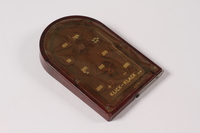
Klick-Klack handheld pinball game with box brought with a young German Jewish refugee
Object
Klick Klack, a handheld pinball game brought with 8 year old Anneliese Centawer when she and her parents James and Recha fled Nazi Germany in July 1938. After Hitler and the Nazi regime's seizure of power in 1933, the Jewish population was subjected to increasingly harsh persecution. In 1936, Anneliese's family was forced to move from their home in Nuremberg when their block was declared Judenfrei (Free of Jews.) Anneliese was beaten up on the street by a Hitler Youth who accused the freckled, red haired girl of trying to pass for German. In July 1938, with sponsorship from Recha's half-siblings in the US, the family arrived in New York.
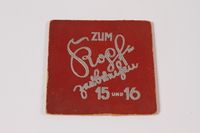
Twelve numbered tiles and box for a game brought with a young German Jewish refugee
Object
Game box with twelve numbered wooden tiles brought with 8 year old Anneliese Centawer when she and her parents James and Recha fled Nazi Germany in July 1938. The tile numbers range from 1 to 15, but there is no number 2, 7, or 11. It is similar in appearance to some versions of a game called fifteen puzzle, but there is no board or platform to contain the loose tiles and the box base seems too high to use for this purpose. After Hitler and the Nazi regime's seizure of power in 1933, the Jewish population was subjected to increasingly harsh persecution. In 1936, Anneliese's family was forced to move from their home in Nuremberg when their block was declared Judenfrei (Free of Jews.) Anneliese was beaten up on the street by a Hitler Youth who accused the freckled, red haired girl of trying to pass for German. In July 1938, with sponsorship from Recha's half-siblings in the US, the family arrived in New York.
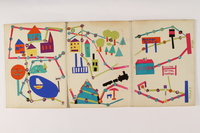
Handmade traffic board game and instructions brought with a young German Jewish refugee
Object
Board game made from brightly colored cut construction paper brought with 8 year old Anneliese Centawer when she and her parents James and Recha fled Nazi Germany in July 1938. It includes several pages of instructions handwritten in English and German. After Hitler and the Nazi regime's seizure of power in 1933, the Jewish population was subjected to increasingly harsh persecution. In 1936, Anneliese's family was forced to move from their home in Nuremberg when their block was declared Judenfrei (Free of Jews.) Anneliese was beaten up on the street by a Hitler Youth who accused the freckled, red haired girl of trying to pass for German. In July 1938, with sponsorship from Recha's half-siblings in the US, the family arrived in New York.
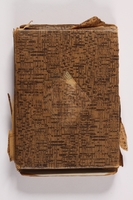
Two decks of Patience cards with 3 boxes brought with a young German Jewish refugee
Object
Boxed set of Patience playing cards, one red, one blue, brought with 8 year old Anneliese Centawer when she and her parents James and Recha fled Nazi Germany in July 1938. The ace of hearts in each deck is stamped with a government control stamp with the Nazi eagle. After the Nazi regime's seizure of power in 1933, the Jewish population was persecuted with increasingly severity. In 1936, Anneliese's family was forced to move from their home in Nuremberg when their block was declared Judenfrei (Free of Jews.) Anneliese was beaten up on the street by a Hitler Youth who accused the freckled, red haired girl of trying to pass for German. In July 1938, with sponsorship from Recha's half-siblings in the US, the family reached New York.
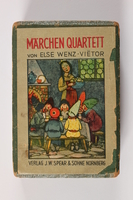
Marchen Quartett deck of fairy tale cards with box brought with a German Jewish refugee
Object
Marchen Quartett, a boxed deck of 40 cards for a fairy tale matching game brought with 8 year old Anneliese Centawer when she and her parents James and Recha fled Nazi Germany in July 1938. After Hitler and the Nazi regime's seizure of power in 1933, the Jewish population was subjected to increasingly harsh persecution. In 1936, Anneliese's family was forced to move from their home in Nuremberg when their block was declared Judenfrei (Free of Jews.) Anneliese was beaten up on the street by a Hitler Youth who accused the freckled, red haired girl of trying to pass for German. In July 1938, with sponsorship from Recha's half-siblings in the US, the family arrived in New York.
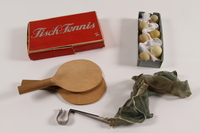
Boxed Tisch-Tennis set with net, paddles, and 6 balls brought with a young German Jewish refugee
Object
Boxed Tisch-Tennis (Table Tennis) or ping pong set with net, 2 paddles, 6 balls, and instruction sheet brought with 8 year old Anneliese Centawer when she and her parents James and Recha fled Nazi Germany in July 1938. After Hitler and the Nazi regime's seizure of power in 1933, the Jewish population was subjected to increasingly harsh persecution. In 1936, Anneliese's family was forced to move from their home in Nuremberg when their block was declared Judenfrei (Free of Jews.) Anneliese was beaten up on the street by a Hitler Youth who accused the freckled, red haired girl of trying to pass for German. In July 1938, with sponsorship from Recha's half-siblings in the US, the family arrived in New York.
Anneliese C. Marx papers
Document
Two (2) composition books used by Anneliese (nee Centawer) Marx in 1937 in pre-war Nazi occupied Germany; documents and photographs surrounding the Centawer family. Includes business contracts from the Centawer family in Nuremberg, early 1900s, documents and photographs related to the military service of James Centawer during World War I, a German passport for Recha Centawer and her daughter, Anneliese, from 1938; a genealogy of the Hutzler family, undated; a letter from an American soldier named Leroy Hutzler, seeking after the well-being of the Hutzler family in Germany, 1919; and a copy of a 1988 article written by Anneliese Marx, and published in New York Newsday, describing her first trip made to Germany since having left it in 1938.



